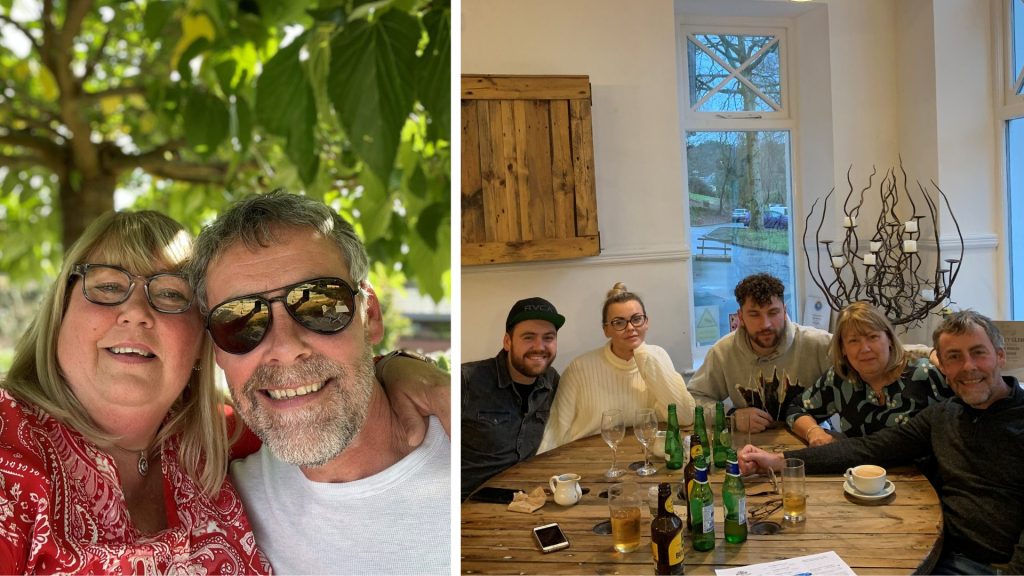“When you’re diagnosed with stage 4 lung cancer, you try and stay positive. You hope for a miracle. In my case, that miracle came true…”
It was just before the pandemic, in January 2020, that Glenys Gregory was diagnosed with lung cancer. She had been suffering with a pain in her clavicle, which had moved down her arm. A good friend who is a GP noticed Glenys was struggling one day and when she told him about her symptoms, he knew something wasn’t right.
“He said my symptoms were ‘classic lung cancer’,” Glenys recalled. “This really shocked me because I always thought if you had lung cancer you would have a cough or get out of breath easily. I had just come back from holiday and had done lots of snorkelling. My lungs felt absolutely fine, so it was hard to believe this pain could be lung cancer – but it was.
“The immediate plan was ‘treat-to-cure’. They were going to put me on a 35-day course of radiotherapy to shrink the tumour, followed by surgery and chemo. It was a tough regime, but I was determined to give it ago.
“However, when my biopsy results came back, the plan changed. I was told I was good candidate for immunotherapy and started on that soon after.

“My experience with immunotherapy was far from plain sailing! After one session, I experienced severe side effects. I had a superior vena cava obstruction. I swelled up and it severely affected my breathing. However, five days of radiotherapy cleared it up.
“I also had really bad rashes all over my body and developed colitis. It was pretty horrific at times. The colitis especially really impacted on my life and what I could do.
But despite how bad it got, I tried to stay positive. In fact, we were told that side effects were actually a good sign because it meant that the treatment was working so that kept me going.
“I nearly managed to complete the course, but the side effects were too bad. They were severely impacting my quality of life; the treatment was making me sicker than the cancer, so my MDT and I agreed to stop the treatment in July 2022.
“I know many people feel very anxious about stopping treatment. It is a scary prospect to stop taking what is keeping your cancer stable. Again though, I tried to focus on the positives of not being on active treatment.
All of a sudden, my calendar went from medical appointments to social ones! Instead of having treatment, I was treating myself to lunch with friends, hair appointments, a trip to the shops! It was very freeing.
“It’s now been 14 months since I stopped having immunotherapy. I obviously still have check ups and scans and up until now, everything has been stable. Then in June 2023 I received the news I never thought I’d hear… I was in remission.
“My husband, David, burst into tears. I sat there in shock, not quite daring to believe what I was hearing. I even made them print out a copy of the results so I could see it for myself in black and white.
“I’ve always thought of myself as a positive person, but I never thought it was possible for someone with stage 4 lung cancer to go into remission. My hope was that it remained stable for as long as possible but remission – that is nothing short of a miracle and I intend to make the most of the opportunity I have been given.
“My daughter got married in December 2020. I remember going wedding dress shopping with her, watching her find her perfect dress. I sat there thinking to myself, would I get to see her in that dress. I asked my consultant about it at time, and he said he’d like to think that I’d see more than that.
“How right he was because not only did I see Natalie in her wedding dress on her big day, but I also saw her become a mum. My first grandchild, Jacob, was born in January and he has given me even more of a spring in my step.

“I know how lucky I am. Sadly, my experience isn’t the case for that many people with lung cancer, but I am hopeful, with all the number of new treatments that are coming through, more miracles will happen.
“That’s why I wanted to share my story. I remember how awful it was to first hear those words – you have lung cancer. Your brain instantly goes to the worst-case scenario. It’s my hope that my experience – whilst horrendous at times – shows people that there can be more positive outcomes for people with stage 4 lung cancer.”



